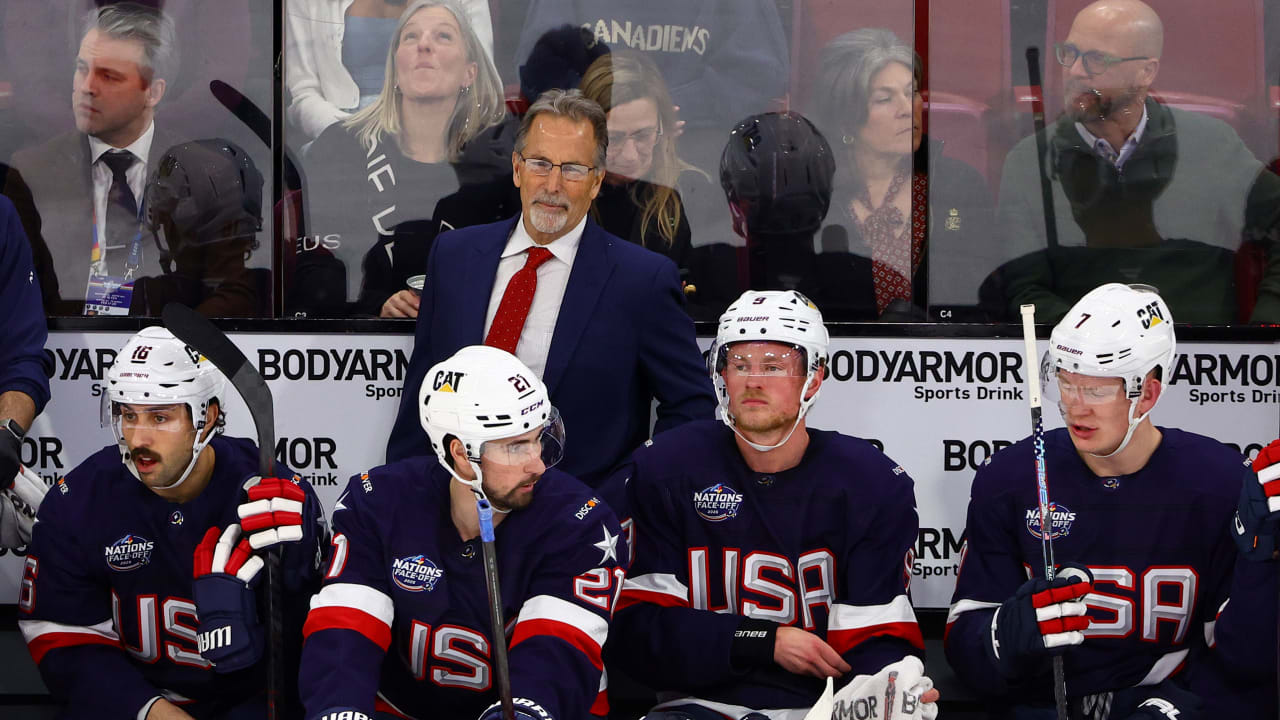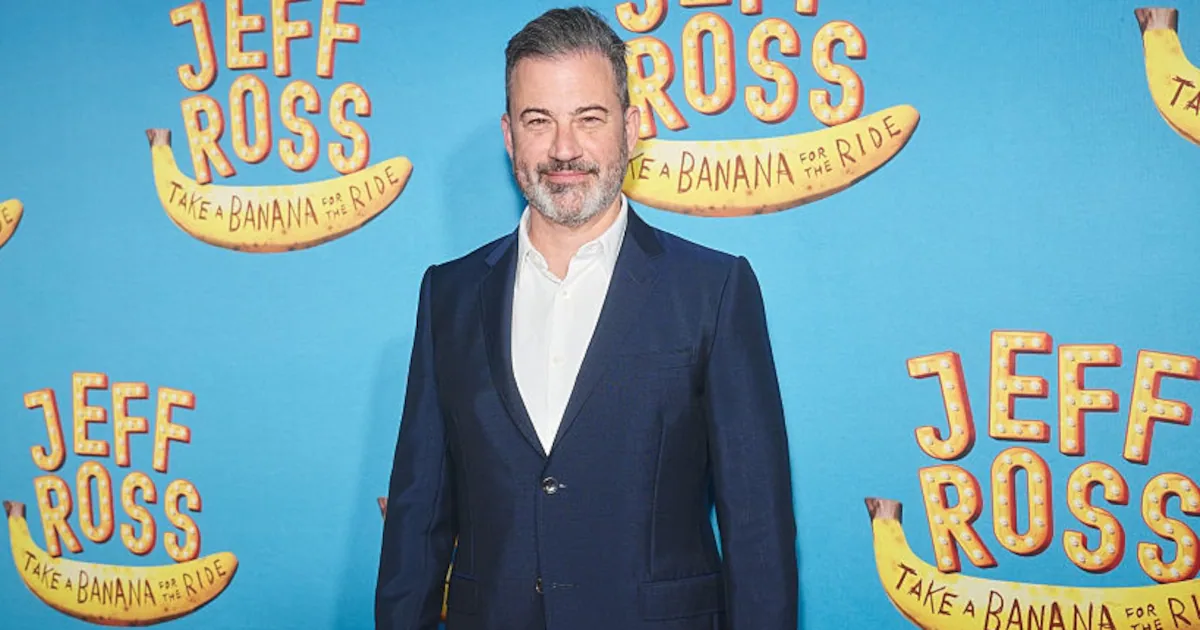
When Mike Sullivan put together the United States coaching staff for the 4 Nations Face-Off, he reached out to one of his mentors, John Tortorella.
He had spent years as an assistant under Tortorella and wanted him to bring his unique perspective. He wanted him to display another side of his personality too.
“I said to him, ‘I would like you to take on a different role than you are as a head coach,’” Sullivan said. “‘I don’t want you to be the hammer. I’ll be the hammer. I want you to be the old wise man.’
“‘I want you to reveal yourself to the players and the other coaches. I want you to show the John Tortorella that I know, that my wife knows, that my kids know, that your kids know, that you don’t show the world very often.’
“And I said, ‘If you can bring that to this staff and our team, I think you’re going to be a tremendous value.’
“And that’s what he did.”
Tortorella took exception to the word “old.” At 67, he has only 10 years on Sullivan.
“Tell ‘Sully’ to [bleep] off,” Tortorella said with a laugh.
Tortorella would rather call himself “experienced.”
Although it was an adjustment for him to serve as an assistant at 4 Nations, Tortorella contributed his wisdom, including helping Sullivan decide when to put brothers Brady Tkachuk and Matthew Tkachuk on the same line.
The United States came close to winning the tournament, losing to Canada 3-2 in overtime at TD Garden in Boston on Feb. 20.
Now Tortorella will return to Sullivan’s staff for the Olympic Winter Games Milano Cortina 2026 and play a key role as the United States tries to win Olympic gold in men’s hockey for the first time since 1980.
Tortorella wants to coach in the NHL again. But for now, he isn’t leading an NHL team, so he can focus on the Olympics, scouting players on video and in person to help the United States build its roster.
“We have such a big base of skill and toughness and will in the U.S. program right now competing for these jobs on this Olympic team,” Tortorella said. “For me to be able to go out and watch this type of stuff, I mean, it’s fantastic. I won’t be making decisions. I’ll have my input, obviously. …
“I’m going to tell you how I think. I’m going to tell you what I think of the player. No matter if it’s good or bad, I’m going to be honest with you. I think that’s what I need to do and not get caught up in the name but just get caught up in how they’re playing.
“Yeah, so kind of a different role, but a really exciting role for me.”
* * * * *
Sullivan stressed the importance of chemistry in best-on-best tournaments, not just for the players, but for the coaches too.
The team must come together quickly. There is little practice time and lots of pressure in high-stakes games. You must plan for each contingency and then make decisions in the moment.
You need people you can trust.
Sullivan respects Tortorella’s resume and has a tight relationship with him.
Tortorella won the Stanley Cup with the Tampa Bay Lightning in 2004 and the Jack Adams Award as NHL coach of the year with the Lightning in 2004 and the Columbus Blue Jackets in 2017.
He has coached 1,620 NHL regular-season games, first among coaches born in the United States, and has 770 NHL regular-season wins, second among coaches born in the United States behind Peter Laviolette (846).
Sullivan served as an assistant under Tortorella with the Lightning (2007-08), New York Rangers (2009-13) and Vancouver Canucks (2013-14), plus the United States for the World Cup of Hockey 2016 in Toronto.
“He helped me become the coach that I am today, and now the roles are reversed,” said Sullivan, who led the Pittsburgh Penguins to the Stanley Cup in 2016 and 2017 and now coaches the Rangers. “In a lot of ways, I think he takes a lot of pride in it. I think.”
Tortorella does.
“I’m so proud of him, of where he’s gone to as a coach,” Tortorella said. “I think he’s one of the top coaches, if not the top coach, in the National Hockey League.”
Sullivan said he and the other U.S. coaches for 4 Nations and the Olympics — assistants John Hynes and David Quinn — are “video junkies,” breaking down clips and studying the little picture. With his experience, Tortorella looks at the big picture. He has a sense on the bench.
“I thought it was one of his strengths when I worked with him and observed,” Sullivan said. “He’s got a unique ability to kind of tweak personnel when things aren’t going the right way or whatever. It’s the art of coaching, I guess, as opposed to the science.”
It paid off during 4 Nations.
The coaches spent hours sketching lines and defense pairs ahead of the tournament. On paper, the line of Matthew Tkachuk, Jack Eichel and Kyle Connor looked good because of the forwards’ complementary skill sets. Tkachuk would go to the net. Connor would bring speed. Eichel would be the linchpin.
But on the ice in the opener against Finland on Feb. 13, the line didn’t look good. The score was 1-1 early in the second period when Sullivan asked Tortorella about Plan B: the Tkachuk brothers with Eichel.
“I said, ‘What do you think?’” Sullivan said. “And he goes, ‘Give it a couple shifts. We’ll see what happens.’”
Sullivan waited a couple shifts. Not much happened.
“I kind of looked down at him, and he goes, ‘Now’s the time,’” Sullivan said. “… My gut feeling is, ‘OK, I’m going do this,’ and then when he kind of says to me, ‘I agree,’ that for me is the affirmation.”
The change helped ignite the United States, which went on to win 6-1.
“You don’t have the luxury of letting lines or defense pairs play their way through things,” Sullivan said. “It’s not like you’ve got [an 82-game schedule and] 60 games in front of you. The tournament’s over before it starts. You’ve got to have a short leash. You just do, I think. That’s part of that experience, right?
“And that was something that ‘Torts’ brought to our staff, brings to me in particular. And sometimes I would have a coffee with him, just him and I, he has a good feel for me too. Not just players and the team. He knows me, so he has a good feel for me, and he in a lot of ways was …
“He’s kind of like, you know, he’s the consigliere, you know? He has a good feel.”
Tortorella said there is a fine line in a best-on-best tournament. These are the top players in the world, and they need some space to figure it out themselves. But with so little time and margin for error, you must be ready to act when necessary.
“You can’t do too much coaching,” Tortorella said. “You need to get out of their way sometimes. But then you get to the point where we just … It just wasn’t good, and I think the move really helped us. A couple of those lines we’re probably going to go back to right away when the Olympics start.”
Tortorella said he thinks he can still help Sullivan.
“I’ll sit back, but I’m certainly going to voice my opinion on what I think needs to be done in certain spots,” Tortorella said. “And there’s where Sully and I have such a unique relationship. We don’t agree on everything. We’re very direct with one another, and I will be very direct in my thoughts.”
* * * * *
It isn’t necessarily easy for Tortorella to give up the hammer and play the old wise man.
“I have to admit,” he said. “It’s weird for me. I don’t think I’m a very good assistant coach. I want to control things at certain times. When you’re running it, you’re barking, you’re setting up drills, and you’re getting them moving. I can’t do that.”
Tortorella said Sullivan wanted him to run the power play at 4 Nations. He gave his input, but Quinn handled the meetings, because Quinn knew these players and spoke their language.
“You can’t get your ego in the way here,” Tortorella said. “I’d rather be a sounding board and oversee and just give my thoughts as we go through there, because it’s not my team, and these guys are younger coaches that have kind of grown up with this group through USA Hockey. I get it, and it doesn’t bother me at all.”
As an assistant, you have a different relationship with the players. Tortorella tried to get to know them better as people, chatting on the ice before practice or in the hallway afterward about their lives away from the game.
“I felt my way through it,” Tortorella said. “I don’t think I was totally on. I wasn’t sure if I should step up and speak here or be quiet there. I’m still trying to learn that part of it, because I do not want to be in the way and confuse things.
“Quite honestly, I think all coaches — head coach or assistant coaches — need to show who you really are, because I think sometimes people have perceptions of what you are and where your heart is. They don’t have a clue, until you let them in. You’ve got to let them in at certain times.”
Sullivan said before 4 Nations he told video coaches Mike King and Madison Nikkel they would love Tortorella.
“I said, ‘What you see on the TV, I’m telling you, is not what he is,’” Sullivan said. “I said, ‘Here’s the other thing: Don’t kid yourself. He polishes that schtick pretty good. He’s dumb like a fox. I watched it for a long to time.’ So, anyway, I said, ‘You guys are going to be pleasantly surprised.’”
The coaching staff reunited at the United States Men’s Olympic Orientation Camp in Plymouth, Michigan, in August. Sullivan said King and Nikkel found themselves busting Tortorella’s chops at dinner, and they laughed about it afterward, because they never would have imagined they’d do that.
“So now they’ve spent some time with him, right?” Sullivan said. “So we went through the 4 Nations experience. They’re like, ‘Man, I never thought he was that kind of guy.’ I’m like, ‘Nobody does.’ They don’t see that side of him.
“He doesn’t let [people see it publicly]. In a lot of ways, I wish he would, because, I mean, he’s one of my dearest friends, right? I wish he would let the world in a little bit, because he’s an incredible person, and he’s a hell of a coach.”
* * * * *
The Philadelphia Flyers fired Tortorella as coach March 27, when they were 0-5-1 in their past six games and one point ahead of the Buffalo Sabres for last in the Eastern Conference.
“It was kind of weird for me, getting fired with nine games left,” Tortorella said. “It really surprised me. [General manager Danny Briere] and I did have some disagreements on discipline of a player, had some disagreements the last few weeks of that season.”
Tortorella said he holds no grudges about being fired, but he didn’t like some of the blowback.
He wanted to explain what he meant after a 7-2 loss at the Toronto Maple Leafs on March 25, when he said, “I’m not really interested in learning how to coach in this type of season, where we’re at right now.”
He said it wasn’t that he didn’t want to coach the Flyers.
“I loved coaching them,” he said.
It was that he didn’t like playing out the string.
He had pushed the Flyers hard for almost three seasons. They were about to miss the Stanley Cup Playoffs for the third year in a row under him and fifth straight overall, and management had sold off pieces leading up to the NHL Trade Deadline again.
“I think a coach has to change,” Tortorella said. “I think a coach has to show the players respect, that you’re not backing off, but you also care about the grind that they just went through and they’re done in another few weeks.
“That’s what I was saying. I don’t want to learn how to coach that way. I don’t know how to coach that way, and I don’t want to learn. If you can keep yourself out of those spots of playing to the end, you won’t be good at that.
“I’ve seen teams be really good playing out a season when it means nothing. You’re relaxed. I’ve seen players play better. I’ve seen coaches … I don’t want to be that guy. It was out of respect to my team that I was not doing a good job. I wasn’t.
“Do I think I should have got fired for it? No. But I have too much respect for those players to kick the hell out of them right to the bitter end.
“It was the right thing to do by Danny [to sell at the deadline]. They’re doing it the right way, and I was on board with that. But it’s hard. It’s hard for those guys, and that’s what I was trying to say after Toronto.”
Tortorella wanted to make a couple of other things clear:
“Do I want to coach again? Yeah,” he said. “I heard a couple NHL coaches accuse me [of quitting on the team]. Did I quit on the team after those comments I made in Toronto? I haven’t quit on a [bleeping] thing in my life. Those comments were totally taken out of [context].
“Listen, I don’t think I explained myself totally correctly, either. But I miss it already. I miss preparing [for] camp. I miss the camaraderie of camp. Yeah, I want to coach, so we’ll see what happens.”
* * * * *
In the meantime, Tortorella will be all about the Olympics.
General manager Bill Guerin said after coming so close to defeating Canada at 4 Nations, the United States has to “find an edge” and “figure out a way to get over the hump” at the Olympics.
It remains to be seen how much the roster will change. The United States invited 44 players to orientation camp (an injured Matthew Tkachuk did not attend). Sullivan said each player is in the running to make the 25-man roster.
“We’ve identified a number of players that we’ve got to really kind of get eyes on early and often,” Guerin said. “Torts is going to help us out with that as well. … Management and coaches watch games differently. We watch it like a scout; they watch it like a coach. So, it’ll actually be nice to get his view from a coaching aspect.”
Tortorella said there are probably four to six spots where the United States could tweak the roster. Guerin hasn’t given him a specific list of players to scout yet. Once he does, he’ll watch players on video, but he’ll try to watch them in person as much as possible. You can see only so much on video, and management and the coaches want to be fair.
“It’ll be really interesting for me selfishly, because I’m not going to be looking at a team play,” Tortorella said. “I’m going to be looking at a player play, and I’m usually wrapped up in watching [the] team concept. I’m going to be looking at skill. I’m going to be looking at will. I’m going to be looking at intangibles. All that stuff comes into play.”
What does the wise old man think the United States needs to do to get over the hump?
“It’s a great question,” Tortorella said. “To get over the hump, it doesn’t have to do with your physical skills — your skating, your speed, your goal-scoring. It has nothing to do with that. It’s a mindset.”
Tortorella said the United States has its eyes on Canada. The players must think, “They’re not doing it again to us.” They must think, “We’re the team now. We’re going to show you that we can beat you.”
“Don’t look by any other team,” Tortorella said. “But there’s no [gosh darned] question in my mind we’re looking right at Canada, and we want another shot at them, and they want another shot at us. Great people in both groups. No disrespect to anybody. I hope it comes to that, and that’s where I want to see us take the next step mentally.”
It will be special to help the United States go for gold with Sullivan, one of his proteges.
“Bottom line is, I know his family well, his kids,” Tortorella said. “We’ve been so close for so long. He’s a good [bleeping] person, and I think players see that. I think the players see that he cares about them, and I think they see the care of winning.
“That’s a tough thing to do, to blend together without players thinking you’re selfish, it’s all about you. It’s not about him. It’s about the product of trying to win hockey games. He wants to take care of you. He wants to know you. He wants to feel for your family. But he’s going to push you to areas that you’re not used to getting to, because that’s how you win.”



